The Borderlands - The Healers

A Trained Medical Doctor also using herbs--San Juana Mendoza, M.D Dr. Mendoza says, "My formal training was as a general practitioner. I have knowledge on medicine, but sometimes those medicines are too expensive for my patients. Simple cough syrup will cost 10 - 15 dollars.
A mom can prepare her own cough syrup in her own kitchen just by combining bee honey, lemon juice, and some herbs we have available here in the area like eucalyptus, oregano, and a little bit of garlic. This makes an excellent cough syrup."
"As doctors we understand that liquids are one of the best things for sick people. But if I just tell a mother to give her child more fluids, maybe she will not understand or think it is important. But if I tell her to make this herb infusion and give her child a cup every 3 hours, it works in two ways - the herbs help and the water is very good."
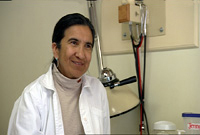
Dr. San Juana Mendoza
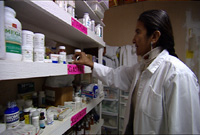
The pharmacy
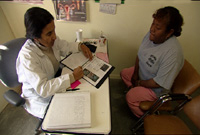
Dr. Mendoza and a patient at her clinic
The population Dr. Mendoza serves along the border migrated north, mostly from the interior of Mexico in search of jobs. These people have very limited education and earn only about 35 to 45 dollars a week in the factories (maquilas) along the border. Dr. Mendoza reports that once they have a steady income, their lifestyle changes for the worse. They tend to buy corn chips, junk food, and get addicted to sugar based sodas. They ride the bus to work and work at the maquilas sitting down or doing repetitive operations. So they start developing diseases that were not common in their villages like hypertension, diabetes, arthritis, even depression.
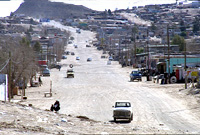
Along the border
Dr. Mendoza reports many of her patients simply cannot afford the drugs. "I recommend to them to use natural things that are available, like a healthy diet, a healthy plan of exercise, and also to use wild herbs that are available in our community. After all, many medicines are based on herbal principles, many herbs have given us the active principles in the synthetic medicines."
She continues, "I see lots of patients, lots of families that come from the country, and they tend to disconnect with their cultural roots. They tend to forget their ancestor's knowledge. Every tribe used to have their own medicine and their own spices and their own food. One of my duties is to remind them about this link between them and their environment. To help them recognize all these sources that we have. To recognize the plants and accept and come back to the use of herbs that are practical. This then helps them save money and gives them more independence."
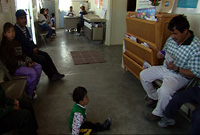
Inside Dr. Mendoza's clinic
Dr. Mendoza says, "My main concern is to teach the people on how to stay healthy. To stay on the right path and to prevent complications that will take them to hospitals or require traumatic treatments. If eventually a woman comes to me and tells me that she knows how to take care of her family now and I don't have to come to you anymore, then I feel happy." "I got into medicine because I knew first hand the needs. I come from a mining family. My father, my grandfather,and my uncles were miners and they worked in the "Sierra Madre" of Chihuahua. I was aware of the hard life one lived in isolated places where no medical resources are available. For me, it was a painful memory to see my mom not sleeping through the night because she had a sick baby. She didn't have the resources to go to the doctor and for me that was a very painful to see a mother suffering because the child is sick."
A Traditional Village Healer
Amada Aguilares Martinez is a curandera or local healer in a small village in Oaxaca. She explains how she learned about medicinal plants. "My mom showed me because the children would get sick and she would look for herbs. She would bathe us or give us something to drink. I memorized the herbs she used so I could use them, too. I work with herbs, but I also work with God, because God left us these plants on the land to cure His children."
The people who come to Amada pay her whatever they think is appropriate. Although she says another curandero nearby does have set rates for his cures. With modern doctors far away, herbal healers are the primary source of medical care for many Oaxaqueños, who are mostly subsistence farmers. Amada is sad, however, that none of her children wanted to learn from her. They have all moved away from the village. She worries her knowledge of desert plants will die with her.
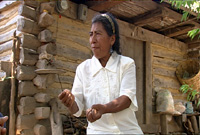
Amada Aguilares Martinez
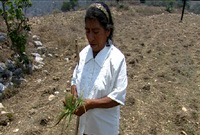
Picking the right herb
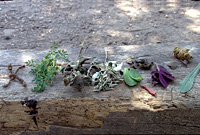
Medicinal herbs
Healers in the Students' Families
Dr. O'Connell says, "Many times students will come to my office to be interviewed for working in the research labs. And when I describe the project to them, the medicinal plant project, they'll say, 'Oh yeah, my grandmother made me a tea whenever I had a stomach ache or I had this when I had a headache'. Many times in their childhood or even in adulthood, they were given preparations made from regional plants to make them feel better. It was quality of life medication not really used for traumatic events. Therefore, it was a natural and appropriate treatment that the families automatically gravitated to and used."
For more information about this website.
Contact the webmaster to report any problems with this site.
New Mexico State University is an equal opportunity/affirmative action employer and educator. NMSU and the U.S. Department of Agriculture cooperating.